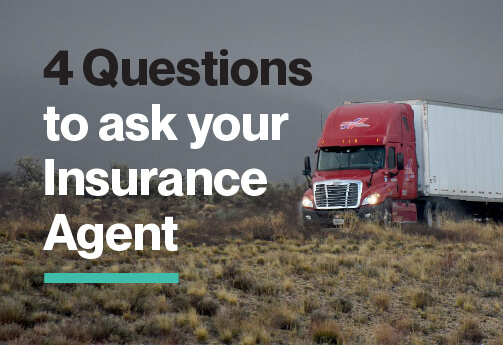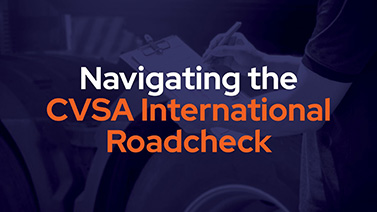4 Questions to ask your insurance agent

As a fleet owner or manager, you consistently seek operational excellence. You are responsible for delivering unmatched service to your clients, requiring each truck in your fleet to maintain the highest possible safety and efficiency standards.
Navigating the modern landscape of fleet management often presents challenges, not least of which is the rise in operational expenses. Insurance premiums, in particular, often represent one of the most substantial costs. An eye-opening study from the American Transportation Research Institute (ATRI) recently demonstrated a staggering increase of 47% in insurance premium costs per mile over the last decade.
With these escalating costs, selecting insurance coverage wisely is more crucial than ever. As your insurance renewal period draws near, empower yourself with key questions for your insurance agent and discern the responses that align with your business’s best interests.
Here are five (notice the bonus) crucial questions when considering new insurance options:
1. What factors contribute to my insurance premiums?
Comprehending the variables that shape your premium determination is crucial for making informed comparisons between insurance providers and coverages. Traditional factors include the type of cargo commodities transported, the kinds of trucks in your fleet, loss history, CSA scores, and the distances your vehicles cover.
However, these metrics can sometimes paint an incomplete picture of a fleet due to delays in recognizing operational improvements by insurance carriers. An example is when a company instigates significant changes that enhance safety, but these improvements don’t reflect in premiums for an extended period.
As a motor carrier, you should seek an insurance company that looks beyond these traditional factors and can provide lower premiums in real-time using modern safety technology, such as telematics data and advanced safety features built into your equipment.
2. What coverage options are available, and what are the payment structures?
Insurance coverage must suit your fleet’s distinctive needs. Conventional coverage options for fleets encompass primary auto liability, physical damage, motor truck cargo, and truckers’ general liability, alongside various endorsements.
Depending on your operation, you may want to consider a mileage-reporting payment structure or a scheduled unit flat monthly payment. There are benefits to both, and HDVI offers a pay-per-mile with no minimum mileage reporting policy and an interest-free installment plan scheduled unit policy that will suit your needs.
HDVI policies are written on A.M. Best A- rated paper with re-insurance provided by an A+ global reinsurer.
3. Can telematics data from ELDs, dash cams, or other safety technologies lower insurance costs in real time?
Fleets often invest significantly in technologies like ELDs and dashcams but see minimal returns from insurance companies. With HDVI’s proprietary risk model, HDVI Shift®, comprised of over 3.5 billion miles from 80,000+ trucks, insureds can receive discounts upfront and throughout their policy period.
Prospective insureds can choose to share their previous 90 days’ worth of telematics data pre-bind through our Safety Lookback process to receive an upfront discount or begin receiving monthly discounts post-binding with HDVI. Either way, fleets can save up to 20% off their base auto liability rate, which can be a substantial amount of money to reinvest into your business.
Moreover, HDVI provides fleets without existing network-connected dash cameras with state-of-the-art road-facing dash cameras at no extra charge. There’s never been a better time to leverage your telematics to receive immediate discounts on your insurance.
4. Are claims handled in-house by the insurance carrier?
Instead of using a third-party administrator to handle claims, In-house claims management offers many benefits, from streamlined communication to faster resolution times. At HDVI, we handle claims internally, providing you with a single point of contact and minimizing the likelihood of misunderstandings that can arise when dealing with third parties.
Those insured by HDVI receive the added benefit of working with a claims and fleet services team with expertise in using telematics data and dashcam video to help manage claims effectively and achieve the best outcomes for your company.
Learn more about our 24/7/365 in-house claim handling process here.
Bonus Question 5. Does the insurance company offer a dedicated safety point of contact?
Fleet owners, managers, and others in a trucking company often wear several hats. Juggling multiple priorities can often mean certain initiatives, such as deep dives into your telematics data, get pushed aside.
As a motor carrier, you want to partner with an insurance carrier, like HDVI, that pairs all new insureds with a dedicated Fleet Services Representative that consults with you periodically on industry best practices, safety and compliance standards, telematics analytics, and actionable insights. Our dedicated Fleet Services team helps our insureds reduce costs, mitigate risks and run a more efficient business.
HDVI is committed to providing insurance that empowers you to control your costs effectively. We offer exemplary customer service, including in-house claims handling and comprehensive coverage options tailored for your fleet. We invite you to visit our website and get in touch with us to explore further. Together, we can shape a safer, more efficient future for your fleet.
Editor’s Note: This post was originally published in July 2022 but has been updated for accuracy and comprehensiveness.


